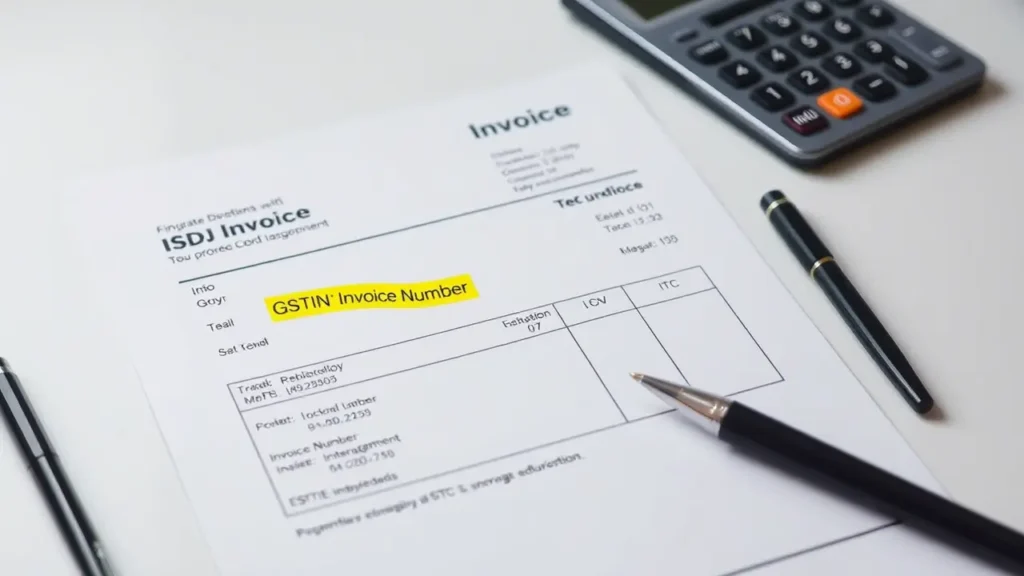
Here I will discuss about How to apply for ISD registration under GST, understand mandatory requirements, documents, processes, and key rules like Rule 65 & 42. Includes examples, FAQs, and recent updates for 2025.
The Goods and Services Tax (GST) system in India has simplified taxation, but certain concepts like Input Service Distributor (ISD) can still confuse businesses. If your company operates across multiple states or branches, understanding ISD registration under GST is crucial. This guide explains everything you need to know, from documents to processes, rules, and examples.
What is an Input Service Distributor (ISD) in GST?
An Input Service Distributor (ISD) is a business entity that receives invoices for common services (like legal fees, advertising, or IT services) used by multiple branches or units. The ISD distributes the input tax credit (ITC) from these services to eligible branches.
Example:
Imagine a company “ABC Ltd.” with offices in Delhi, Mumbai, and Bangalore. If ABC’s head office in Delhi pays ₹1,00,000 for a legal service used by all branches, the Delhi office (registered as ISD) will distribute the ITC proportionally to each branch.
Is ISD Registration Mandatory Under GST?
Yes, if your business meets these conditions:
- You have multiple GST registrations (e.g., branches in different states).
- You receive invoices for common services used by these branches.
- You need to distribute ITC across units.
ISD registration mandatory notification (2025 Update):
As per the 2025 GST update, businesses with an annual turnover exceeding ₹20 lakhs (₹10 lakhs for NE states) must register as ISD if they distribute ITC.
Documents Required for ISD Registration Under GST

Here’s a table of documents required for ISD registration under GST:
| Document | Purpose |
|---|---|
| PAN Card | Identity proof of the business. |
| Aadhaar of Authorized Signatory | KYC verification. |
| Proof of Business Address | Electricity bill/rent agreement. |
| Bank Account Details | Cancelled cheque or bank statement. |
| Authorization Letter | For signatory authority. |
| Digital Signature Certificate (DSC) | For online submission. |
ISD Registration Process: Step-by-Step Guide
Step 1: Log in to GST Portal
Visit [www.gst.gov.in] and log in using your credentials.
Step 2: Navigate to ‘Services’ > ‘Registration’ > ‘New Registration’
Select “Input Service Distributor” as the registration type.
Step 3: Fill Form GST REG-01
Provide business details, PAN, and address.
Step 4: Upload Documents
Attach scanned copies of the required documents.
Step 5: Submit with DSC/E-Signature
Use a Digital Signature Certificate or E-Signature to submit.
Step 6: Receive ARN
An Application Reference Number (ARN) is generated. Track status via GST portal.
Step 7: GSTIN Allotment
Once approved, you’ll receive a GSTIN for ISD.
Example:
XYZ Corp. applied for ISD registration on 15th Jan 2025. They received their GSTIN in 7 working days.
Turnover for ISD Distribution Under GST
The threshold limit for ISD registration is ₹20 lakhs (₹10 lakhs for NE states). Even if your turnover is below this, voluntary registration is allowed.
Key GST Rules for ISD
Rule 65 of GST Rules
Governs ISD credit distribution under GST. ITC must be distributed via ISD invoice to eligible branches.
Rule 42 & 43 of GST
- Rule 42: Deals with ITC reversal for exempt supplies.
- Rule 43: Applies to capital goods’ ITC distribution.
Rule 37 of GST
Requires ITC reversal if payment to the supplier isn’t made within 180 days.
When is ISD Not Applicable?
- If services are used exclusively by one branch.
- For goods procurement (ISD only applies to services).
- If turnover is below the threshold limit.
ISD Invoice Format

An ISD invoice must include:
- GSTIN of ISD and recipient branch.
- Invoice number and date.
- Amount of ITC distributed.
- Signature of authorized signatory.
Conditions for Distributing ITC as ISD
- ITC must be distributed via ISD invoice.
- Credit must be distributed within the same financial year.
- Only distribute ITC to branches with the same PAN.
Can ISD Pay GST Under RCM?
Yes, under Reverse Charge Mechanism (RCM). For example, if a foreign service provider is used, ISD can pay GST under RCM and distribute the ITC.
What is the 750 limit for RCM?
Small businesses with turnover < ₹50 lakhs can pay RCM only if monthly liability exceeds ₹750.
FAQs on ISD Registration Under GST
What is the full form of ISD?
Input Service Distributor.
Is ISD registration compulsory for all businesses?
No, only for those distributing ITC across branches.
How long does ISD registration take?
7-15 days after document submission.
Can ISD distribute credit for goods?
No, only for services.
What happens if I don’t register as ISD?
ITC claims may be disallowed, leading to penalties.
Can a proprietorship apply for ISD?
Yes, if it has multiple GST registrations.
Is a digital signature mandatory for ISD registration?
Yes, for companies and LLPs.
Can ISD distribute credit to unregistered branches?
No, all branches must be GST-registered.
What is the penalty for late ISD registration?
₹100/day (max ₹10,000).
How is ITC calculated for distribution?
Proportionally based on each branch’s turnover.
Also Read
- How to Cancel GST Registration in 2025
- How to Calculate GST Backwards with Examples? In 2025.
- How is GST Included in MRP? In 2025
Conclusion
Navigating ISD registration under GST is essential for businesses with pan-India operations to legally distribute input tax credit (ITC) across branches. With the 2025 updates, compliance has become stricter, emphasizing proper documentation, adherence to rules like Rule 65 and 42, and timely submission of ISD invoices. Registering as an ISD not only streamlines credit distribution but also prevents ITC mismatches and penalties. Whether your business is newly expanding or already multi-state, understanding the mandatory thresholds, invoice formats, and RCM applicability ensures seamless GST compliance. By following the steps and guidelines outlined, businesses can avoid legal hurdles and optimize tax efficiency. Stay informed, stay compliant, and leverage ISD registration to strengthen your GST framework.